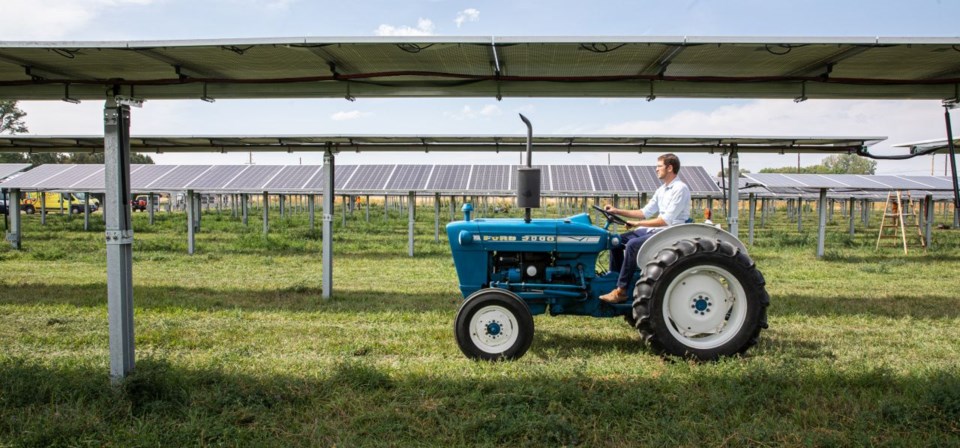Jack’s Solar Garden, a project of more than 3,200 solar panels capable of creating 1.2 megawatts, launched last month, bringing potential for offsetting carbon dioxide emissions as well as establishing precedent as the largest commercial agrivoltaics system in the country, according to Byron Kominek, owner and manager.
Kominek has been working over three years to turn what was once his grandfather Jack’s farm into a solar garden and, with it, the potential to cultivate both food and energy. “Agrivoltaics offers the opportunity to produce clean energy on farmland while still keeping soils productive, simply by elevating solar panels and spacing them out appropriately,” he said.
Located about a mile southeast of Longmont’s Oskar Blues, Jack’s will produce enough power for over 300 homes in Boulder County, Kominek said. The garden also will serve as a research subject for the National Renewable Energy Laboratory, Colorado State University and the University of Arizona to study vegetation and microclimate created by the solar array, he said.
“There's more and more research being released about the large potential of storing carbon in healthy soils,” Kominek said. “Agrivoltaics is thereby a wonderful way to mitigate climate change by reducing our need for fossil fuels while also continuing to sequester carbon in soils and producing agricultural products.”
The farm also provides a cleaner energy alternative to cannabis production, an industry consuming a staggering amount of electricity compared to business and residential use.
According to a National Conference of State Legislatures report, the average electricity consumption of a 5,000-square-foot indoor facility in Boulder County was 41,808 kilowatt-hours per month in 2015, compared to 630 kilowatt-hours for an average household. “The link between cultivation and energy consumption … is an issue becoming increasingly more relevant,” the report states.
Bonnie Bahlmann, co-owner of In The Flow, a boutique cannabis wholesale cultivator, said part of its overall mission has been reducing its carbon footprint. As a member of the steering committee for the Boulder County Energy Impact Offset Fund, she has been part of the work group seeking to make the industry more sustainable, she said.
“That combined with my natural interest in environmentalism just kind of spurred me to start looking for ways that we could become 100% offset in our electricity use,” Bahlmann said. “We are on the road to that goal and Jack’s is part of the equation in helping us get there.”
In The Flow is currently Jack’s largest subscriber, taking a quarter of the power. “We subscribe to about 800 solar panels and those panels generate electricity on a monthly basis, then we pay Jack’s Solar Garden for production of that electricity. In return we get a credit on our Xcel bill for the electricity that was produced at Jack’s,” she said.
Bahlmann said her business has taken other measures to achieve its electricity offset goal, including participating in the county’s energy analysis project.
“For the industry it’s really been a struggle to offset because most solar gardens out there have … some financial backing that is tied up federally,” she said, adding that in the past it’s been difficult for cannabis businesses to buy into an average solar garden, which is a big impediment for anyone in the industry. "In a political climate where we receive minimal direction or inspiration on sustainability from our federal government, we all need to be asking ourselves what we can do personally as well as in our professional lives to reduce our carbon footprint. In The Flow's partnership with Jack's Solar Garden was born out of that initiative."
Not only is Jack’s pushing the boundaries in the farming and cannabis industries, the solar garden has been working closely with local governments to provide electricity savings and help achieve 100% electricity from renewable sources.
“Boulder County sees Jack’s Solar Garden as the kind of business that exemplifies the innovative, environmental, and social spirit of Boulder County, and we are thrilled to be a part of its launch,” Susie Strife, Boulder County’s Sustainability coordinator, stated in a news release announcing the county’s subscription to the garden.
Kominek said the county’s subscription has been a huge help. “(It) has helped provide confidence to residential subscribers that we were worth subscribing to,” he said, adding that the county’s payment also helped Jack’s obtain a bank loan as well as pay for its construction.
Beyond provision of cleaner energy, Jack’s is working on other initiatives to bring value to Boulder County’s communities. “We're family-owned, not investor-owned, so our priority is to make good use of our land for the coming decades,” Kominek said.
The farm is donating 2% of the electricity bill credits produced through Xcel Energy to the Boulder County Housing Authority, running an Artist on the Farm program, will be offering educational tours for local schools and has partnered with Sprout City Farms to train young farmers in agrivoltaic techniques while selling and donating food to the local community, he said.
“(I) want to work with farms along the Front Range who are interested in the work we're doing and want to learn how they can create a similar agrivoltaics project for their family's and land's benefit,” Kominek said. “Agrivoltaics needs to be in our society's toolkit for fighting and adapting to climate change.”


